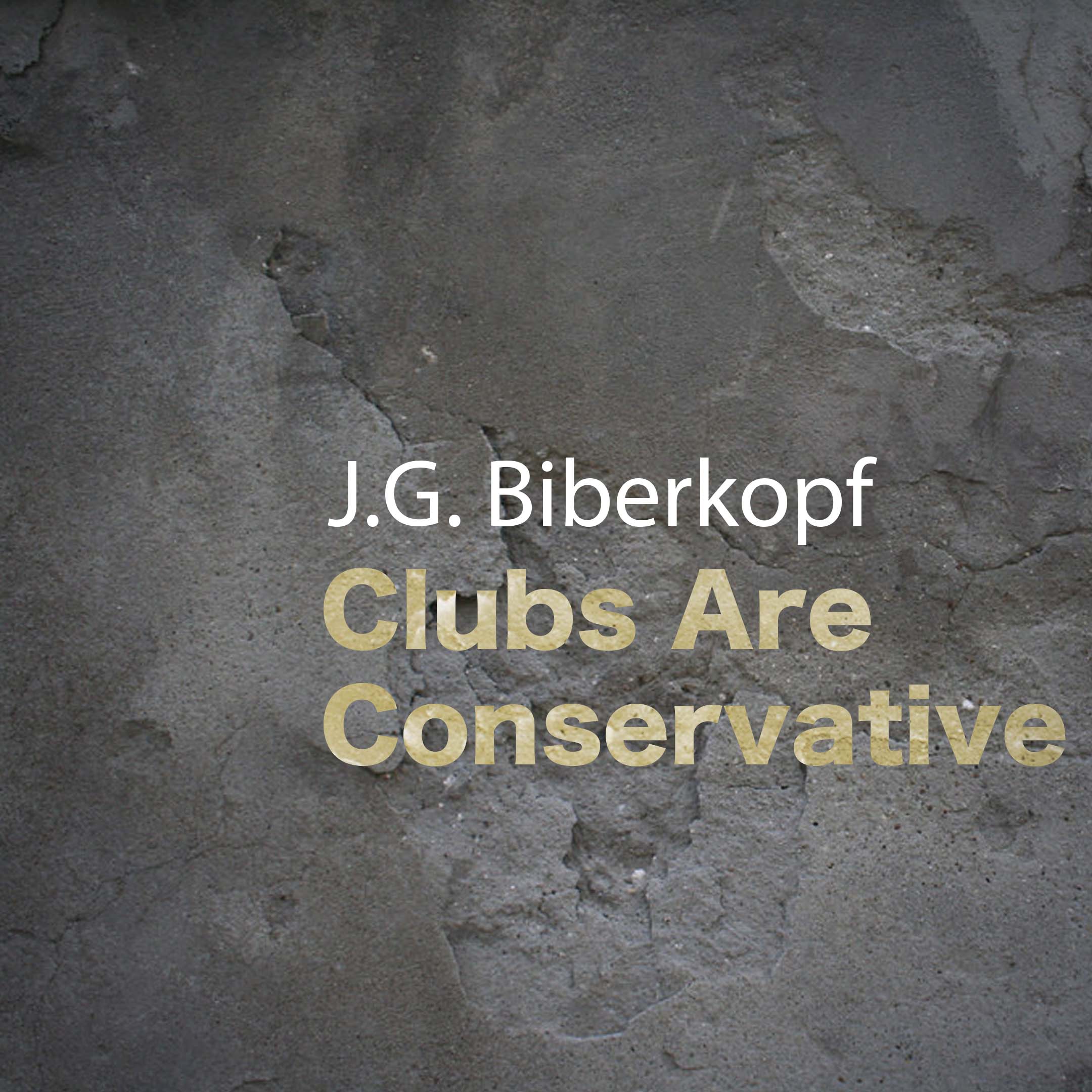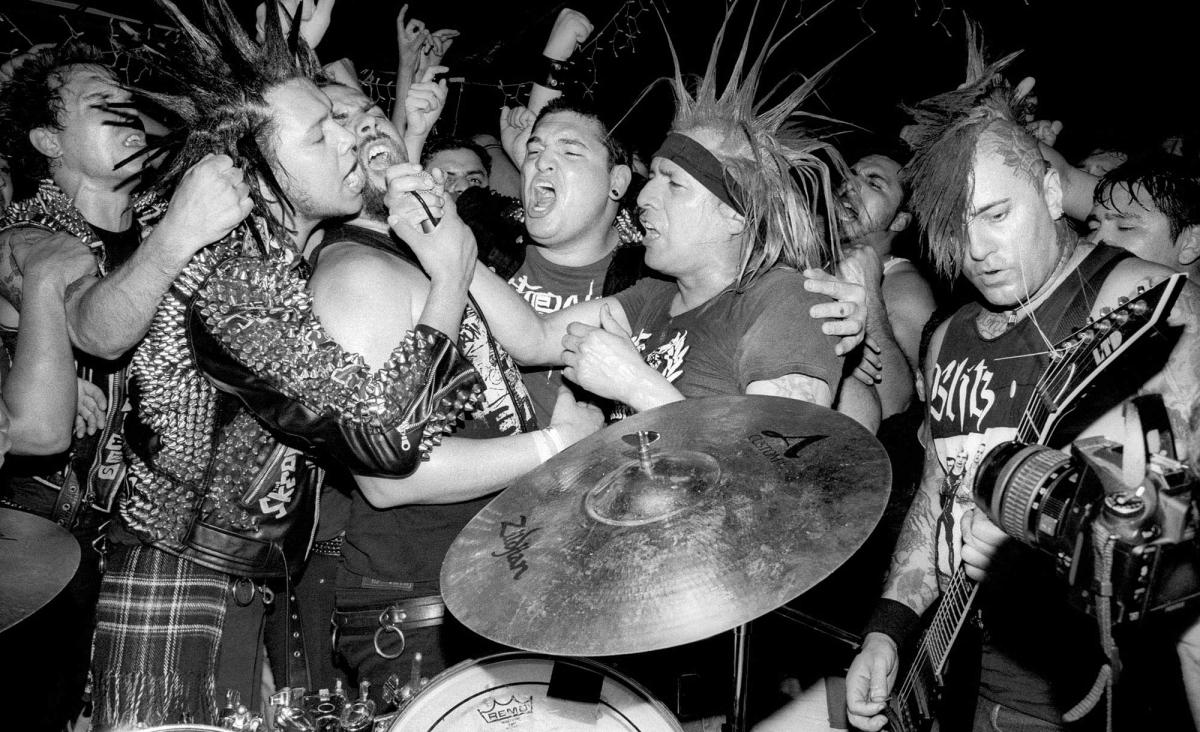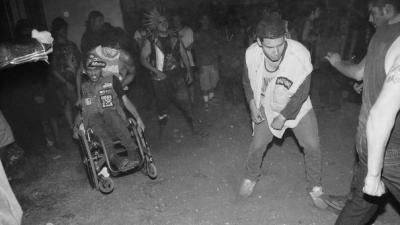
J.G. Biberkopf: «Clubs Are Conservative»
J.G. Biberkopf's music is as challenging as it is engrossing. On his new album Ecologies II: Ecosystems of Excess, he explores the way global politics shape the ecosystems of the earth. Norient talked to him about looking for a political stance in a troubled world and making music within the «exploitation mechanisms» of art institutions.
Although he grew up in Vilnius, Lithuania, J.G. Biberkopf's music first came to our attention within the art music meets club music interzone associated with collectives like Fade To Mind and Night Slugs. After releasing mixes through Truants and The Astral Plane, he released his debut EP Ecologies in 2015 through Kuedo and Joe Shakespeare’s Knives label. A year on, he's just expanded on it with his debut album Ecologies II: Ecosystems of Excess, again released through Knives.
Where his first EP was crafted as a journey through the representations of nature that emerge with the social media landscape, the creation of his album was driven by his reading and thoughts on the way global politics shape the Earth's ecosystem as well as the architectures and infrastructures of power. Fashioned out of a mixture of field recordings and samples, traditional club music concepts and well thought out theory, it's an immaculately detailed and designed synthesis where although the sum is resolutely bigger than it's parts, they all play their own crucial roles within Biberkopf's musical ecosystem.
Given the level of detail and thought behind the album, the musician opted to extend the narrative with an artbook housed in the album's packaging. Designed an illustrated by award-winning cult design studio Maximage, it also contains an essay based on the album written by New York writer Deforrest Brown Jr. In celebration of the release, I asked J.G. Biberkopf about amongst other things, his background, processes and the experiences that went into the creation of the album and the supporting book.
[Martyn Pepperell]: I understand you started making music on pirated software as a reaction to the social environment while you were growing up in Vilnius? Could you expand on this period a bit more? What were you listening by to before heading down the producer route? And how did giving yourself these tools open up the world for you?
[J.G. Biberkopf]: Well, my parents are from information sciences - mother is a mathematician and father is an engineer, both work in IT now, so I ended up well versed in these things. While I was growing up the country was going through an extreme transition from being occupied by the Soviet Union, so bootleg and piracy culture blossomed - nobody would question the morality of pirating, so my parents would never say that paying for entertainment or pleasure is reasonable.
In parallel, when I was a teen, I went to quite bad schools in tough neighbourhoods. I was unhealthy - I got diagnosed with bipolar and I ended up falling out of the educational system altogether. In the end for me, music was like carving out a space, getting a load off, expressing, creating an identity, which wouldn’t be allowed, in that particular social order which was very traumatising and violent. I think the turning point in how I relate to music was hearing Nas’ Illmatic, which was one of the things I really connected to in a profound way. Later on, I was fond of people like John Waters, R.W. Fassbinder, and Gus Van Sant, Keren Cytter, even later on, Ryan Trecartin, which I got to know about early on through piracy and initiatives like ubu.com.#
A New Consciousness
[MP]: Your music is driven by your thoughts around how global politics shapes the Earth's ecosystem and the architectures and structures of power. What sort of experiences or discoveries pushed you in this direction, and why did music feel like the appropriate platform for you to address these issues?
[JB]: Well, it’s one of the worst platforms for these things – that I’m pretty much certain by now – especially on its own. Although I’m doing it wrong, it’s interesting and a lot of the time frustrating to make it work. I think with projects like Drexiciya and Underground Resistance, the way they used instrumental music as a platform for political activism and experimentation became a huge influence for me. Also, the way Holly Herndon and Mat Dryhurst did it with Platform last year was encouraging, to see how they manoeuvre the complicated farce that music media and industry is, to start a conversation about anything meaningful to bring specific discourses.
Artists like Nkisi, Aisha Devi, D’eon who experiment with music (in order) to invent new ways for new modes of existence, and for new philosophies are a continuing influence. I am disillusioned with club entertainment, electronic music. For me, it is important to escape the old tradition of this music with a fixation on the technological, which in my view is a heritage of electronic music instruments evolving out of military technologies.
But if we’re talking about the direction of the album, I think I was reading Mckenzie Wark’s texts. I got the realisation that new patterns of climate conditions and irregularities mean a disruption in how society relates to each other: a new consciousness, and new modes of existence for inhabitants of the Earth, which isn’t that original I guess? In the end, the Ecologies II was an effort to understand how I should position myself in the contemporary order of things, and carve out a way of living. Integrity is criticised a lot, but I still hold it in high regard. I believe in the «practice what you preach» approach. So, I think by the time I finished the record I had become quite ascetic.
[MP]: I also understand that on another level Ecologies II was written in response to your experiences travelling through the megapolises of South East Asia. When and why did you start visiting these places, and what did you learn from your time in them?
[JB]: I think this is a story that has begun to live its life, which has not that much substance. I wouldn’t give a particular place that much of importance. But I was travelling through South East Asia at a time which I think was a critical point for the album. I did write a couple of tracks that were a reaction to experiences here, like for example «Globalalia» which I think is probably a response to experiences to EDM parties in Malaysia and realisation how globalisation and modernity go hand in hand with particular strands of club music.
Also while here I was reading Keller Easterling’s Extrastatecraft, which was the best book I could pick up by accident for travelling. It gave a lot of insight, but that book’s work needs to be a whole conversation. I am currently in Bangkok and will move on from here for the next couples of months, doing «research». I am very much interested in the rapid continuing modernisation, especially the patterns of spatial production and the protocolization of usage of space here.
Clubs Are Conservative
[MP]: Ecologies II is built out of field recordings, programmed parts, melodies and sound design. It's an accelerated take on musique concrete and its techniques. Do you consciously think of yourself as working in a musique concrete tradition or not?
[JB]: I don't think I'm part of the canon. I have pretty limited knowledge of it, but certain ideas and pieces do resonate with me. I learnt about musique concrete early on. If to continue name dropping, I think Helena Gough’s album Microklimata was the first piece of musique concrete that I connected with. Then there's work of Luc Ferrari, his Anecdotal compositions and theory of it. AGF’s experiments in 00's were especially dear to me.
I tend to get annoyed when what I do is called sound design, I don’t even know what it means (likewise «producer») which is almost a way of not accepting certain language as music. It is funny that people can still be conservative about it. Clubs are conservative in unexpected ways. When you confront certain definitions of music, certain expectations of music that are dominant, you shouldn’t be surprised when faced with derision. Although with this album, I think it is a bit different, since I believe it is trying to be more «musical». Knives pushed for releasing the more musical tracks, so a lot of «musique concrete» pieces got left out.
[MP]: Over the last couple of years, there has been an increase in the number of albums written as investigations of ecology and life cycles, be it life cycles of a creature or even a massive star. Do you have any thoughts on why these sort of topics are coming up at the moment?
[JB]: Honestly, apart from a particular group of people, loosely connected via social media, I pretty much stopped following and listening to contemporary electronic music. I really struggle to legitimise listening to a lot of it for various reasons. I also have to do stressful work most of the time, which hijacks my mind entirely – and I can’t do background listening at all. So I don’t know what is happening in the media, or what the dominant discourses are.
Of course, if going back to the questions, there's a lot more effort to understand what’s going on. The same rise in «investigations» are happening in academia, theory and art, where's there so much more about the effort to understand implications, of this transition on a global level, speculate on what is going to happen, and how you react and mobilise. Some of the work is worse – especially when it tries to capitalise on it – some is better, when it actually contributes knowledge.
Music for Active Listening
[MP]: Ecologies II is a truly immersive album that really rewards close listening. What was it that made you want to create a record that worked like that? Obviously, I'm overly cynical here, but sometimes it seems like this is one of the hardest periods of time to hold someone's attention in ever.
[JB]: Well, I don’t know if you could universalize that experience. It’s an unpleasant event, which you choose to partake in. I don’t make it for passive listening, and I think at certain moments, I make decisions that are fighting against it becoming background music. Jamie [Teasdale aka Kuedo] did have an impact on the album, – in making it «immersive» and «cinematic». As I was experimenting with applying classical dramaturgical theory for my live shows, and Jamie’s much more well versed in classical composition, we found a common language. So he gave a lot of insight. I think it worked together to lead the album to where it is at.
[MP]: The LP version of Ecologies II comes with an essay by Deforrest Brown Jr. packaged in an artbook format designed by cult design studio Maximage. Why was it important to present the album with this supporting material, and what sort of processes did you have to work through to get it over the line?
[JB]: Well, the «artbook» started, as there was a need, to give any clue onto the knowledge that I try to build with the Ecologies project, especially since it’s becoming less about the music, more about the research. I think music becomes mostly a reaction to the research I do, and the way I do research is less and less compatible with composing music. Also with the label, we were thinking of ways to get away from the LP format, we thought of doing more of a book, with more contributors, but in the end, we had to go with this compromise for various reasons.
So I started talking with Deforrest last year, as I felt that he shared a lot with what I was going through. This lead to us having these dense conversations through this year, about what we are both thinking about what’s happening and where we are coming from in connection to it. I made these chapters of the whole ecologies system, he started writing, and we would go back forth responding to each other. It ended up being an especially dense piece, which can be alienating by its complexity – Deforrest tends to write in concentrated sentences – but I think it nails it, and it kind of becomes a sort of a manual to the Ecologies series.
[MP]: I note that this project would not have been possible without the kind support of CTM and Deutschlandradio Kultur Radiolab. What sort of relationship do you have with these organisations and what did they bring to the table? How important do you see this sort of support as being for people working within this space?
[JG]: Me and Marija Bozinkovska Jones were selected to create a performance for CTM’s & Deutschlandradio Kultur Radiolab last year. It allowed experimenting with a lot of ideas with support on various levels from these organisations. They give and they take, but what they take is pretty respectful and the compromises you make aren’t at all corrupting. I genuinely enjoyed the experience. We had some screw ups with the performance itself, but the experience itself was brilliant, especially when compared to working with significant art institutions, which honestly a lot of the time feel like complex exploitation mechanisms, scams driven by their symbolical capital. Anyway, I am incredibly grateful that I am able to do projects like that, with some financial support, which allows me to escape much more compromising commercial projects in order to make ends meet.
Biography
Published on January 11, 2017
Last updated on April 02, 2024
Topics
How do musicians fill or widen the gap of feeling at home in a world that is radically unhomely?
A generative practice that promotes different knowledge. One that listens is never at a distance but always in the middle of the sound heard.
Place remains important. Either for traditional minorities such as the Chinese Lisu or hyper-connected techno producers.
How does the artits’ relationship to the gear affect music? How to make the climate change audible?
Snap





